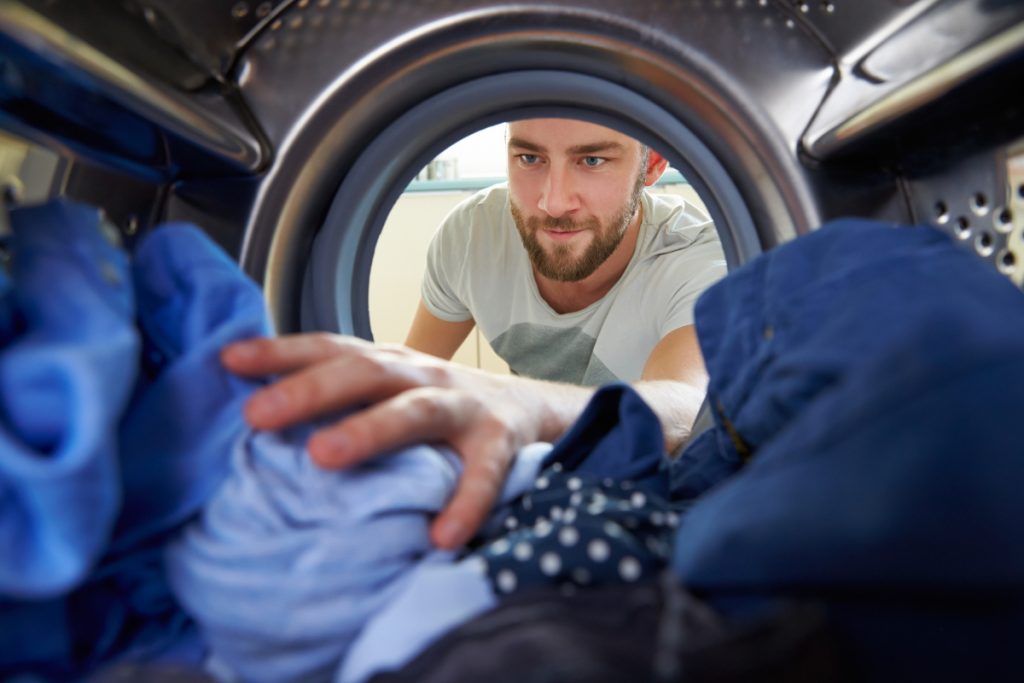The products and services mentioned below were selected independent of sales and advertising. However, Don't Waste Your Money may receive a small commission from the purchase of any products or services through an affiliate link to the retailer's website.
Though at least one study has found that laundry ranks among our least favorite household chores, you can stop dreading laundry day if you avoid a few common laundry mistakes. By becoming a laundry expert, you will find that this once-dreaded task becomes a streamlined, simple routine that brings cleanliness and order to your home.
What are the most common laundry mistakes that people make? Check out the below list of common laundry blunders and learn what you should do instead — and see if you can turn your most hated household chore into one you almost enjoy.
You Overdo The Detergent

Most people use way too much detergent in their clothes. When you overdo the detergent, it doesn’t have enough time to fully rinse out of your clothes as intended. This is especially true if you have a high-efficiency washer, as they use less water to reduce waste.
So resist the idea that using a lot of detergent will get your clothes extra-clean. It is just the opposite: Too much detergent will leave your clothes rough and itchy. For an average-sized load of laundry, you only need one tablespoon of detergent. If you have a high-efficiency washer, you need even less (about two teaspoons on average, depending on how big your load is).
Usingdetergent pods can take the guesswork out of your laundry, but just know that the cost can be exorbitant. Pods can be about 50% more expensive than traditional detergent, but if you’re prone to dumping way too much detergent into your washer, pods could end up saving you money in the long run — and saving your clothes from detergent damage, as well.
You Don’t Sort Your Clothes
We get it: Sorting clothes seems like something that belongs in the horse-and-buggy era. But it’s so much easier these days to keep laundry sorted before you even walk into the laundry room. Partitioned laundry hampers make laundry sorting easy for everyone, even little kids. You can find laundry basket options with labeled partitions like this one on Amazon:
Have a laundry basket that is only for whites, so that when you do a load of whites you can use bleach or bleach alternatives to keep them bright and fresh. You should also separate your colors into two groups: Your darks (think black leggings or dark t-shirts) should go in one load, while your lighter colors (such as blue jeans or bright tees) should go in a separate load.
It can also be helpful to sort by fabric type or by how dirty your clothes are. Many people prefer to wash things like their exercise clothes or hiking gear or their kids’ soccer clothes in a separate load, and the same goes for really dirty stuff like your dog’s favorite blanket or your kid’s smelly gym socks.
The nice thing about partitioning your laundry and having very clearly defined loads is that anyone can hop in and do their share. You won’t have kids or spouses claiming “But I don’t know how you like to do it,” because you will have a simple, straightforward pattern that allows for everyone to participate.
You Don’t Zip Up Your Zippers
Most of us wouldn’t think to zip up our hoodies or jeans before tossing them in the wash, but you definitely should.
Why? Leaving your zippers undone can be a costly mistake. This is because the zippers will bash and tear at other items in the wash, leading to potential rips and holes. Zipping up any zippers will also protect the zippers and ensure that they don’t endure undue wear and tear.
You Don’t Turn Your Clothes Inside Out

If you really want to preserve the life of your favorite clothing items, you should turn them inside out before tossing them into the washing machine. This means that the inside of your clothing will take the brunt of the machine’s force while the exterior will be saved from much of the machine’s powerful agitation, helping the fabric quality and color to last longer.
You Use Fabric Softener
Fabric softeners can help to keep fabrics soft and wrinkle-free, but they can also be harmful to your health. Scientific American reports that some fabric softeners include ingredients that are known to be harmful to human health, including chemicals that are carcinogens, neurotoxins or have research-proven ties to certain types of cancer.
Shocking, right? Even if you use the best fabric softener, you still aren’t doing your clothes any favors in the long run. Consumer Reports found that fabric softeners leave behind a chemical coating on your laundry. This is what makes your items feel fluffier and softer, but over time these chemicals can detract from the performance of your clothing as well as lead to mildew buildup in your washing machine.
You Don’t Use Dryer Balls
OK, so fabric softeners aren’t a good bet, but you still want soft, cozy laundry. Fortunately, you can achieve that without any chemicals.
That’s why not using dryer balls is one of the worst laundry mistakes you can make. Dryer balls help prevent clumping, so clothes and bedding don’t get wadded up in the machine. This reduces drying time and helps to naturally soften your laundry.
Check out our list of the top-rated dryer balls here, including these from Amazon.
If it’s a lovely scent you’re after, some reviewers suggest adding a few drops of essential oil to your dryer balls before tossing them in with your wet laundry. It will scent your clothes with a light fragrance — no chemicals needed.
This story originally appeared on Don't Waste Your Money. Checkout Don't Waste Your Money for product reviews and other great ideas to save and make money.


